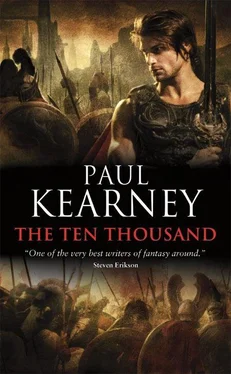Paul Kearney - The ten thousand
Здесь есть возможность читать онлайн «Paul Kearney - The ten thousand» весь текст электронной книги совершенно бесплатно (целиком полную версию без сокращений). В некоторых случаях можно слушать аудио, скачать через торрент в формате fb2 и присутствует краткое содержание. Жанр: Фэнтези, на английском языке. Описание произведения, (предисловие) а так же отзывы посетителей доступны на портале библиотеки ЛибКат.
- Название:The ten thousand
- Автор:
- Жанр:
- Год:неизвестен
- ISBN:нет данных
- Рейтинг книги:5 / 5. Голосов: 1
-
Избранное:Добавить в избранное
- Отзывы:
-
Ваша оценка:
- 100
- 1
- 2
- 3
- 4
- 5
The ten thousand: краткое содержание, описание и аннотация
Предлагаем к чтению аннотацию, описание, краткое содержание или предисловие (зависит от того, что написал сам автор книги «The ten thousand»). Если вы не нашли необходимую информацию о книге — напишите в комментариях, мы постараемся отыскать её.
The ten thousand — читать онлайн бесплатно полную книгу (весь текст) целиком
Ниже представлен текст книги, разбитый по страницам. Система сохранения места последней прочитанной страницы, позволяет с удобством читать онлайн бесплатно книгу «The ten thousand», без необходимости каждый раз заново искать на чём Вы остановились. Поставьте закладку, и сможете в любой момент перейти на страницу, на которой закончили чтение.
Интервал:
Закладка:
Antimone was punished also. She had erred in pity, in softness of heart, and so God set her down on Kuf itself to watch over the Macht in all their travails down the millennia. She would foresee the fate of those she loved, but would not be able to change it, and so would weep bitter tears, for she would be witness to every crime that man would commit in his tenure of the earth.
Her sons, Phobos the elder and Haukos the younger, wished to follow their mother to Kuf, but God forbade it as part of Antimone’s punishment. So they drew as near as they dared, riding their great black horses in shadow across the night sky, when Araian the sun was not there to tell God of their doings. Phobos hated the Macht for causing his mother’s exile from heaven, and his white face leered down upon men from the depths of the night sky. But Haukos had inherited his mother’s soft heart. To his pink countenance men prayed for intercession with Antimone, and hence, with God Himself.
Such was the legend.
Whatever their origin, there were some five thousand sets of Antimone’s black armour abroad in the world, and those who bore them were known as cursebearers. The armour was passed down through families for centuries, though many had changed hands in battle. None were ever given up willingly, and a city might go to war for possession of a single black cuirass. Ageless and indestructible, some said that in them resided the very essence of the Macht as a people, and were they to disappear, then so would mankind.
“We saw your scarlet cloak, and the harness you bear, and wondered if you might be hiring,” Rictus said to the man who stood before them now with one of these ancient artefacts on his back.
The man cocked his head to one side. “If I am, I do not hire in the middle of the street. Nor do I like to be shouted at there by boys who still have their mother’s milk about their gums.” One eyebrow rose at this, a mockery, though the rest of his face remained grave.
Gasca took a step forward, but Rictus tilted out his spear to bar his way.
“You’re right, of course,” he said to the cursebearer. “You have our apologies. Would it be acceptable for us to ask you-to ask you where it would be appropriate to look for employment?”
The man smiled at this. “You’ve not done much apologising in your time, boy. But you want employment you say. As mercenaries?
“Yes, sir.”
“And is this all the panoply you possess?”
“What you see is all we have,” Gasca said. “But it has done good service before now.”
“No doubt. But it’s not enough to get you both in the phalanx. One of you, perhaps, but the other will have to apply to the light arm, or else be a camp servant. Go to the northern gate, the Mithannon they call it. Outside the walls there’s a marshalling square surrounded by tents and shacks. That’s where they hire spears in this town.”
“Thank you,” both Rictus and Gasca said at once, eyes bright as those of children promised some treat.
The man chuckled. “You came to the head of the snake. I am Pasion of Decanth. Drop my name there and you may not get as hard a time. It’s late in the day to be touting your wares. Leave it till the morning, and you’re less likely to be manhandled.”
“Thank you,” Rictus said again.
“You’re from Isca, boy, aren’t you?”
“I… How do you know?”
“The way you met my eyes. Most men outside the scarlet drop their gaze for a second on meeting a cursebearer. You’ve had Iscan arrogance bred into you. Let slip that at the hiring-it will do no harm. Now I must go.” He nodded at them both, then turned and resumed his way through the crowd, the people parting before him as though he were contagious.
“We have luck with us,” Gasca said. “That’s a meeting the goddess had a hand in if ever anyone did. And I have seen the Curse of God at last.”
“I didn’t come all this way to be a camp servant,” Rictus said.
“Let us go to that merchant’s inn. We’ll set ourselves up there and see about joining a company tomorrow. We shall eat and drink and wash and find ourselves a bed.”
Rictus smiled. He looked tired, older than his years, pinched with hunger and bad memories. “Lead on then. And take this shield for a while- fair’s fair.”
The Mithannon faced north towards the Mithos River, a grey flash of cold mountain-water that ran parallel to the walls of the city for five or six pasangs. The open plain there had long ago been flattened out and beaten into a dirt bowl around which there clustered irregular lines of wooden shacks and stalls, hide tents made semipermanent with the addition of sod walls, and hundreds of low-roofed ramshackle shelters brought into being with the connivance of a bewildering variety of materials. The place seemed a mockery of the stone and marble majesty of Machran itself, but if one looked closer there was an order to the encampments. They ran in distinct lines, and some were cordoned off with rawhide and hemp ropes mounted on posts. Flags and banners snapped everywhere, a kind of ragged heraldry splashed across them, painted on signposts, daubed on the skewed planks of shacks and cabins. And everywhere in the midst of these crude streets there walked knots and files of men dressed in scarlet of some shade or other. These were the Hiring Grounds, and the Marshalling Yards, and the Spear-Market, and half a dozen other names besides. Here, men might join the free companies, those soldiers who sold their spears to the highest bidder and who owed allegiance to nothing except their comrades and themselves.
In the quarter of the city closest to the Mithannon there was the greatest concentration of wine-shops and brothels in all Machran. Here, the gracious architecture degenerated into a hiving labyrinth of lesser buildings, built of fired brick and undressed stone, roofed with reed-thatch from the riverbanks rather than red tile, and lacking windows, often doors. Men had built upwards here, for lack of space in the teeming alleyways about them. It seemed, looking up from the splash and mire of the noisome streets, that the buildings leaned in on each other for support, and a mason with a plumb-line might look around himself in despair.
Up in the swallow’s eyrie of one of these there was an upstairs room. A man might spit through the gapped planks of the floor there onto the heads of the drinkers below, but somehow the place stood, stubborn and askew and seething with all manner of babel that wine could conjure out of men’s mouths. It was a place where conversations could be had in shouts, and still no one an armspan away would make sense of them.
“When is Phiron to return?” one of the men asked. This was Orsos of Gast, whose face had writ across it the dregs of every crime known to man. He was known as the Bull to friends and enemies alike. Now his deep-set eyes glinted with suspicion. “I have a firm offer from Akanos, me and my centon. Time is money, Pasion. Promises never fattened a purse.”
The cursebearer named Pasion cast his gaze down the long, wine-stained table. Twenty centurions sat there in the faded red chitons of mercenaries. Any one of them alone would have made a formidable foe; gathered together they were a fearsome assemblage indeed. A jug of water sat untouched on the tabletop. Pasion knew better than to buy them wine before the talking was done.
“He is in Sinon,” Pasion said casually, “Putting the final touches to our arrangements. With fair winds and good weather, he’ll be here in a week at the outside. What’s the matter, Orsos; do you have trouble holding your men to the colour?”
“Not since I stopped shitting yellow,” the Bull said, and about the length of the table there were grunts of humour.
“Then have some patience. Pity of the goddess, this is the biggest fee you’ll ever earn and you’re havering over the matter of a few days here and there. If this thing comes off, we will all of us be rich as kings.”
Читать дальшеИнтервал:
Закладка:
Похожие книги на «The ten thousand»
Представляем Вашему вниманию похожие книги на «The ten thousand» списком для выбора. Мы отобрали схожую по названию и смыслу литературу в надежде предоставить читателям больше вариантов отыскать новые, интересные, ещё непрочитанные произведения.
Обсуждение, отзывы о книге «The ten thousand» и просто собственные мнения читателей. Оставьте ваши комментарии, напишите, что Вы думаете о произведении, его смысле или главных героях. Укажите что конкретно понравилось, а что нет, и почему Вы так считаете.












